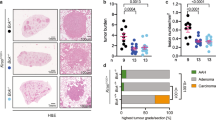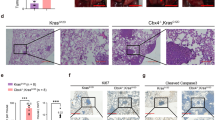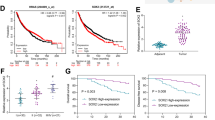Abstract
LKB1 loss is a frequent homozygous deletion and/or gene mutation found in lung adenocarcinomas. However, few cases of LKB1 loss by either deletion or mutation are seen in Asian patients. Our preliminary data showed that LKB1 loss was associated with p53 mutation in lung tumors from Taiwanese adenocarcinoma patients and p53 transcription is directly regulated by NKX2-1. Therefore, we hypothesized that LKB1 loss could occur due to aberration of p53 regulation mediated by NKX2-1. In the present study, 16 lung adenocarcinoma cell lines were investigated to determine if LKB1 transcription could be deregulated by NKX2-1-mediated p53 aberration. Mechanistic studies indicated that LKB1 was directly upregulated by p53 and that NKX2-1-mediated p53 expression may positively regulate LKB1 expression in p53 wild-type cells. However, in p53-mutated cells, LKB1 transcription was deregulated by NKX2-1 via suppression of SP1 binding onto the LKB1 promoter. Therefore, the action of the NKX2-1/p53 pathway on LKB1 loss differed in p53 wild-type versus p53-mutated cells. As expected, soft-agar growth and invasion capability was significantly reduced by ectopic expression of NKX2-1 in p53 wild-type cells, but it was markedly elevated by silencing NKX2-1 in p53-mutated cells. Similar reciprocal observations were also seen in lung tumors from lung adenocarcinoma patients with either wild-type or mutated p53 tumors. Cox regression analysis showed that patients with low-LKB1 tumors had poorer overall survival (OS) and relapse-free survival (RFS) when compared with patients with high-LKB1 tumors. In p53 wild-type patients, shorter OS and RFS periods were predicted for low-NKX2-1/low-LKB1 tumors than for high-NKX2-1/high-LKB1 tumors. In patients with p53-mutated tumors, poorer OS and RFS were predicted for high-NKX2-1/low-LKB1 tumors than for low-NKX2-1/high-LKB1 tumors. In summary, losses of LKB1 at the transcriptional level by altered activity of the NKX2-1/p53 pathway may promote tumor malignancy and poor patient outcome.
This is a preview of subscription content, access via your institution
Access options
Subscribe to this journal
Receive 50 print issues and online access
$259.00 per year
only $5.18 per issue
Buy this article
- Purchase on Springer Link
- Instant access to full article PDF
Prices may be subject to local taxes which are calculated during checkout






Similar content being viewed by others
References
Charloux A, Quoix E, Wolkove N, Small D, Pauli G, Kreisman H . The increasing incidence of lung adenocarcinoma: reality or artefact? A review of the epidemiology of lung adenocarcinoma. Int J Epidemiol 1997; 26: 14–23.
Thun MJ, Lally CA, Flannery JT, Calle EE, Flanders WD, Heath CW Jr. . Cigarette smoking and changes in the histopathology of lung cancer. J Natl Cancer Inst 1997; 89: 1580–1586.
Chen F, Cole P, Bina WF . Time trend and geographic patterns of lung adenocarcinoma in the United States, 1973-2002. Cancer Epidemiol Biomarkers Prev 2007; 16: 2724–2729.
Weir BA, Woo MS, Getz G, Perner S, Ding L, Beroukhim R et al. Characterizing the cancer genome in lung adenocarcinoma. Nature 2007; 450: 893–898.
Shiraishi K, Kunitoh H, Daigo Y, Takahashi A, Goto K, Sakamoto H et al. A genome-wide association study identifies two new susceptibility loci for lung adenocarcinoma in the Japanese population. Nat Genet 2012; 44: 900–903.
Carretero J, Shimamura T, Rikova K, Jackson AL, Wilkerson MD, Borgman CL et al. Integrative genomic and proteomic analyses identify targets for Lkb1-deficient metastatic lung tumors. Cancer Cell 2010; 17: 547–559.
Gill RK, Yang SH, Meerzaman D, Mechanic LE, Bowman ED, Jeon HS et al. Frequent homozygous deletion of the LKB1/STK11 gene in non-small cell lung cancer. Oncogene 2011; 30: 3784–3791.
Sanchez-Cespedes M, Parrella P, Esteller M, Nomoto S, Trink B, Engles JM et al. Inactivation of LKB1/STK11 is a common event in adenocarcinomas of the lung. Cancer Res 2002; 62: 3659–3662.
Ding L, Getz G, Wheeler DA, Mardis ER, McLellan MD, Cibulskis K et al. Somatic mutations affect key pathways in lung adenocarcinoma. Nature 2008; 455: 1069–1075.
Fernandez P, Carretero J, Medina PP, Jimenez AI, Rodriguez-Perales S, Paz MF et al. Distinctive gene expression of human lung adenocarcinomas carrying LKB1 mutations. Oncogene 2004; 23: 5084–5091.
Matsumoto S, Iwakawa R, Takahashi K, Kohno T, Nakanishi Y, Matsuno Y et al. Prevalence and specificity of LKB1 genetic alterations in lung cancers. Oncogene 2007; 26: 5911–5918.
Makowski L, Hayes DN . Role of LKB1 in lung cancer development. Br J Cancer 2008; 99: 683–688.
Koivunen JP, Kim J, Lee J, Rogers AM, Park JO, Zhao X et al. Mutations in the LKB1 tumour suppressor are frequently detected in tumours from Caucasian but not Asian lung cancer patients. Br J Cancer 2008; 99: 245–252.
Sun Y, Ren Y, Fang Z, Li C, Fang R, Gao B et al. Lung adenocarcinoma from East Asian never-smokers is a disease largely defined by targetable oncogenic mutant kinases. J Clin Oncol 2010; 28: 4616–4620.
Onozato R, Kosaka T, Achiwa H, Kuwano H, Takahashi T, Yatabe Y et al. LKB1 gene mutations in Japanese lung cancer patients. Cancer Sci 2007; 98: 1747–1751.
Kim MJ, Jin G, Jheon HS, Lee SY, Cha SI, Kim CH et al. LKB1 mutations are extremely rare in Korean non-small-cell lung cancers. Cancer Genet Cytogenet 2010; 196: 204–206.
Karuman P, Gozani O, Odze RD, Zhou XC, Zhu H, Shaw R et al. The Peutz-Jegher gene product LKB1 is a mediator of p53-dependent cell death. Mol Cell 2001; 7: 1307–1319.
Tiainen M, Vaahtomeri K, Ylikorkala A, Makela TP . Growth arrest by the LKB1 tumor suppressor: induction of p21(WAF1/CIP1). Hum Mol Genet 2002; 11: 1497–1504.
Zeng PY, Berger SL . LKB1 is recruited to the p21/WAF1 promoter by p53 to mediate transcriptional activation. Cancer Res 2006; 66: 10701–10708.
Scott KD, Nath-Sain S, Agnew MD, Marignani PA . LKB1 catalytically deficient mutants enhance cyclin D1 expression. Cancer Res 2007; 67: 5622–5627.
Ji H, Ramsey MR, Hayes DN, Fan C, McNamara K, Kozlowski P et al. LKB1 modulates lung cancer differentiation and metastasis. Nature 2007; 448: 807–810.
Wei C, Amos CI, Stephens LC, Campos I, Deng JM, Behringer RR et al. Mutation of Lkb1 and p53 genes exert a cooperative effect on tumorigenesis. Cancer Res 2005; 65: 11297–11303.
Takeda H, Miyoshi H, Kojima Y, Oshima M, Taketo MM . Accelerated onsets of gastric hamartomas and hepatic adenomas/carcinomas in Lkb1+/−p53−/− compound mutant mice. Oncogene 2006; 25: 1816–1820.
Chen JJ, Peck K, Hong TM, Yang SC, Sher YP, Shih JY et al. Global analysis of gene expression in invasion by a lung cancer model. Cancer Res 2001; 61: 5223–5230.
Morton JP, Jamieson NB, Karim SA, Athineos D, Ridgway RA, Nixon C et al. LKB1 haploinsufficiency cooperates with Kras to promote pancreatic cancer through suppression of p21-dependent growth arrest. Gastroenterology 2010; 139: 97 e1–6.
Kendall J, Liu Q, Bakleh A, Krasnitz A, Nguyen KC, Lakshmi B et al. Oncogenic cooperation and coamplification of developmental transcription factor genes in lung cancer. Proc Natl Acad Sci USA 2007; 104: 16663–16668.
Winslow MM, Dayton TL, Verhaak RG, Kim-Kiselak C, Snyder EL, Feldser DM et al. Suppression of lung adenocarcinoma progression by Nkx2-1. Nature 2011; 473: 101–104.
Tang X, Kadara H, Behrens C, Liu DD, Xiao Y, Rice D et al. Abnormalities of the TITF-1 lineage-specific oncogene in NSCLC: implications in lung cancer pathogenesis and prognosis. Clin Cancer Res 2011; 17: 2434–2443.
Au NH, Cheang M, Huntsman DG, Yorida E, Coldman A, Elliott WM et al. Evaluation of immunohistochemical markers in non-small cell lung cancer by unsupervised hierarchical clustering analysis: a tissue microarray study of 284 cases and 18 markers. J Pathol 2004; 204: 101–109.
Saad RS, Liu YL, Han H, Landreneau RJ, Silverman JF . Prognostic significance of thyroid transcription factor-1 expression in both early-stage conventional adenocarcinoma and bronchioloalveolar carcinoma of the lung. Hum Pathol 2004; 35: 3–7.
Wu YH, Wu TC, Liao JW, Yeh KT, Chen CY, Lee H . p53 dysfunction by xeroderma pigmentosum group C defects enhance lung adenocarcinoma metastasis via increased MMP1 expression. Cancer Res 2010; 70: 10422–10432.
Cheng YW, Wu MF, Wang J, Yeh KT, Goan YG, Chiou HL et al. Human papillomavirus 16/18 E6 oncoprotein is expressed in lung cancer and related with p53 inactivation. Cancer Res 2007; 67: 10686–10693.
Sung WW, Wang YC, Cheng YW, Lee MC, Yeh KT, Wang L et al. A polymorphic −844T/C in FasL promoter predicts survival and relapse in non-small-cell lung cancer. Clin Cancer Res 2011; 17: 5991–5999.
Wu DW, Liu WS, Wang J, Chen CY, Cheng YW, Lee H . Reduced p21(WAF1/CIP1) via alteration of p53-DDX3 pathway is associated with poor relapse-free survival in early-stage human papillomavirus-associated lung cancer. Clin Cancer Res 2011; 17: 1895–1905.
Wu HH, Cheng YW, Chang JT, Wu TC, Liu WS, Chen CY et al. Subcellular localization of apurinic endonuclease 1 promotes lung tumor aggressiveness via NF-kappaB activation. Oncogene 2010; 29: 4330–4340.
Steger DJ, Lefterova MI, Ying L, Stonestrom AJ, Schupp M, Zhuo D et al. DOT1L/KMT4 recruitment and H3K79 methylation are ubiquitously coupled with gene transcription in mammalian cells. Mol Cell Biol 2008; 28: 2825–2839.
Gong F, Sun L, Wang Z, Shi J, Li W, Wang S et al. The BCL2 gene is regulated by a special AT-rich sequence binding protein 1-mediated long range chromosomal interaction between the promoter and the distal element located within the 3′-UTR. Nucleic Acids Res 2011; 39: 4640–4652.
Wu DW, Cheng YW, Wang J, Chen CY, Lee H . Paxillin predicts survival and relapse in non-small-cell lung cancer by microRNA-218 targeting. Cancer Res 2010; 70: 10392–10401.
Acknowledgements
This work was jointly supported by Grants from the National Science Council (NSC99-2628-B-038-016-MY3 and NSC1-100-2314-B-038-043-MY3) of Taiwan, ROC.
Author information
Authors and Affiliations
Corresponding author
Ethics declarations
Competing interests
The authors declare no conflict of interest.
Additional information
Supplementary Information accompanies this paper on the Oncogene website
Supplementary information
Rights and permissions
About this article
Cite this article
Tsai, LH., Chen, PM., Cheng, YW. et al. LKB1 loss by alteration of the NKX2-1/p53 pathway promotes tumor malignancy and predicts poor survival and relapse in lung adenocarcinomas. Oncogene 33, 3851–3860 (2014). https://doi.org/10.1038/onc.2013.353
Received:
Revised:
Accepted:
Published:
Issue Date:
DOI: https://doi.org/10.1038/onc.2013.353
Keywords
This article is cited by
-
Clinicopathological and prognostic significance of LKB1 expression in gastric cancer: a systematic review and meta-analysis
Scientific Reports (2023)
-
NKX2–1 expression as a prognostic marker in early-stage non-small-cell lung cancer
BMC Pulmonary Medicine (2017)
-
Association of cytoplasmic p27 expression with an unfavorable response to cisplatin-based chemotherapy and poor outcomes in non-small cell lung cancer
Tumor Biology (2016)
-
The MZF1/c-MYC axis mediates lung adenocarcinoma progression caused by wild-type lkb1 loss
Oncogene (2015)
-
Decreased LKB1 predicts poor prognosis in Pancreatic Ductal Adenocarcinoma
Scientific Reports (2015)



